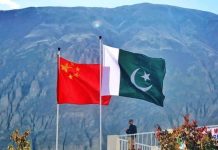KARACHI: “Unquestionably hybrid rice is a model of China-Pakistan agricultural cooperation in Sindh Province,” Mr. Zhou Xusheng, Director of Pakistan Business Department, Wuhan Qingfa Hesheng Seed Co., Ltd. a Chinese developer and provider of hybrid seeds.
Amidst global headwinds, Pakistani rice is facing a series of challenges. Chela Ram Kewlani, President of the Rice Exporters Association of Pakistan (REAP), indicated that during the first seven months of the FY 2022/23, the export value of Pakistani rice decreased by 15.82% year-on-year to USD 1.08 billion, mainly due to flood damage to paddy fields in Sindh, where the local rice production has been reduced by 40%. Qingfa Hesheng has been providing hybrid seeds of rice, canola and vegetables to Pakistan for nearly twenty years, as well as training more than 300 local agricultural personnel. In particular, it registered the first hybrid rice variety -QY0413 in the history of Pakistan.
“It may take three years for the rice export, which is an important means for Pakistan to earn foreign exchange, to recover,” Zhou noted, “however, we have preparation for such situations. First, the stress resistance of crop varieties should be improved. Second, seed production can be carried out separately in Pakistan and China, spreading risk in the face of extreme weather. Currently, our test fields are located in Lahore, Chiniot, Shikarpur, Golarchi.”
“Except for floods, extreme high temperatures brought about by climate change are also difficulties that must be overcome in the upgrading of Pakistan’s rice industry. The annual average temperature here is much higher than that in China’s main rice climate zone. Therefore, in our selection of rice varieties, it is imperative to guarantee the seed setting rate and quality under high temperature. Nevertheless, a coin has two sides. It is precisely because of the hot and dry climate in Pakistan that hybrid rice diseases are much less than those in China, such as bacterial blight, but far less hazardous.”
Data from PBS showed that exports of basmati rice fell 22.95% to 316,055 tonnes in the first seven months of this year from 410,207 tonnes in the same period last year, while exports of non-basmati rice fell 25% to 1.62 million tons. Despite a sharp drop in exports, rice prices have seen unprecedented increases in the domestic market due to inflation and rising international rice prices. –Agencies






